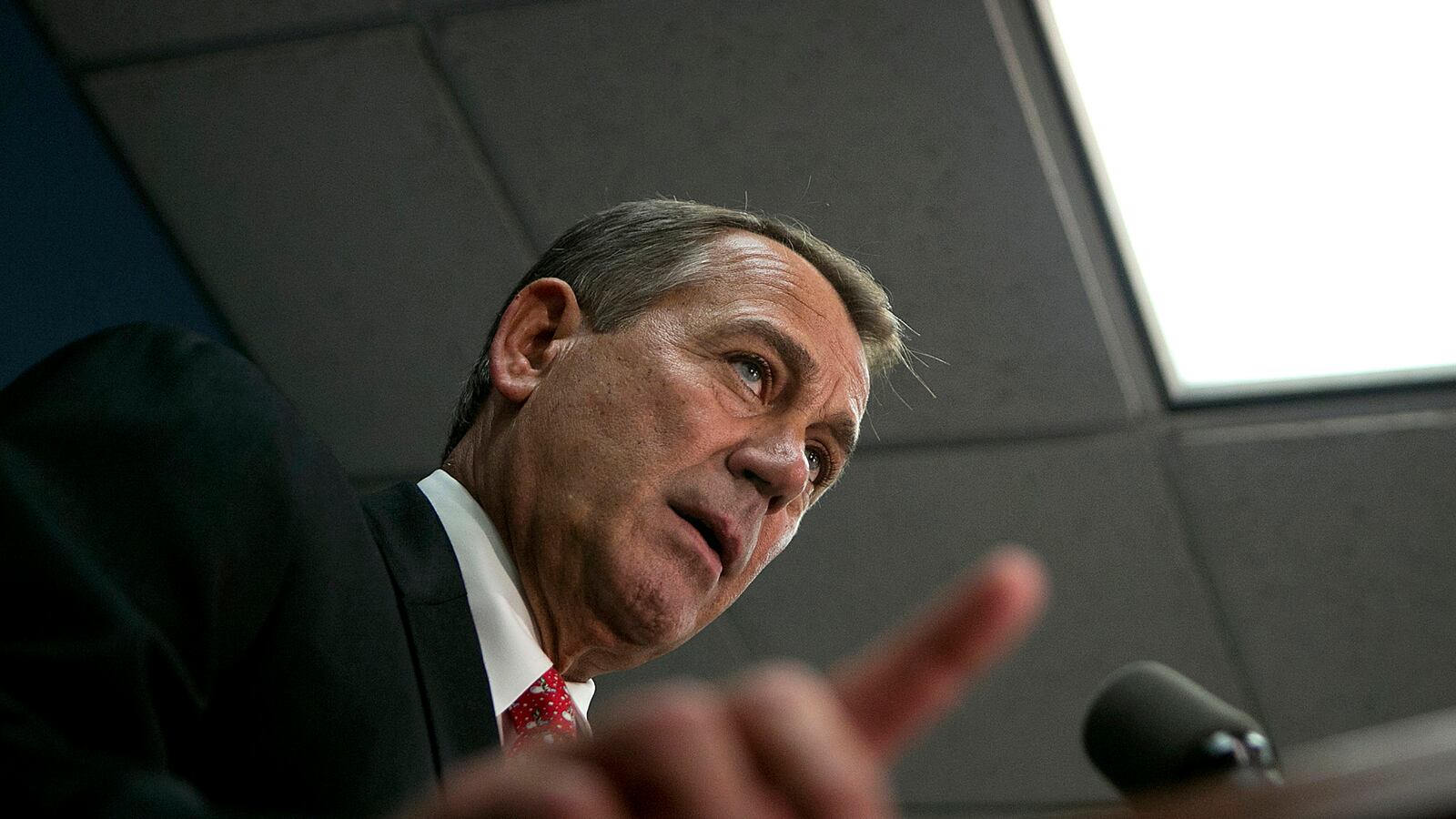John Boehner’s Plan B is pure BS. It couldn’t even pass the House. It would have no chance in the Senate. And it would be vetoed by the president. Talk about a trifecta of futility.

The speaker was reduced to begging for votes from Republicans who can’t abide even a perverse version of social justice: protecting those who make $999,999 a year from paying a higher tax rate. Thursday night, the House GOP wouldn’t go along, even though the bill was ultimately going nowhere. It was a transparent fig leaf—one that that can’t cover up Boehner’s pathetic impotence in making and keeping a deal; Plan B was and is nothing more than a porous prophylactic that couldn’t safeguard Republicans from a free-fall of blame if they push the country off the fiscal cliff.
Boehner himself isn’t crazy. He’s weak. He leaves his tanning bed for a meeting with his caucus only to find himself in a Tea Party tank of crazed ideologues. His latest complaint about Barack Obama sounds like a Freudian slip into a rare moment of self-consciousness: the speaker whose words can’t be trusted is the one who “can’t stand up to his own party”—because he dreads being kicked out of the leadership as he summarily was in the 1990s. His “obsession,” says a White House adviser, is never again to be reduced to the status of just another back-benching golfer from Ohio.
His predecessor, Nancy Pelosi, courageously risked her majority and her speakership to prevail in the landmark battle for health care as a right and not a privilege in America. For that, she did sacrifice her majority, but she will hold a high place in history. Boehner, in contrast, bows to the demands of the far right at the first sign of resistance in his ranks—even now, at a moment that could crash markets, cause a recession, and drive unemployment above 9 percent. Boehner makes Mitt Romney look like a guy with a backbone.
The president, too, is suddenly being reproached by dissident progressive activists for daring to offer a “betrayal” not a “compromise”—to start the top rate of income tax at $400,000 instead of $250,000 and to modify the cost-of-living formula for Social Security. I’m almost always on the progressive side, but the criticism here is wrong on the policy and the politics.
First, Obama, unlike Boehner, is serious about governing. He sees his office as a place to do his job, not just to cling to its title and trappings. He won the election, but he won’t win every point. And he—and Democrats—are in a much stronger position with the country when he seeks a solution instead of indulging pointless, purist politics at a price that, for example, could leave millions of the jobless without benefits and throw nearly 2 million more workers out of work. Their suffering should count more than liberal psychic satisfaction.
What the president has offered may not be ideal, but it is entirely defensible in terms of the real, the possible, and the fair.
The difference between a $250,000 and a $400,000 threshold for the top tax rate is not a matter of bedrock principle—especially in a proposal that would bring in $1.2 trillion in new revenue, primarily from the wealthy.
A “chained CPI”—who comes up with these ridiculous names?—for annual increases in Social Security payments was instantly decried as an “unconscionable” cut. You can debate which cost-of-living adjustment is more accurate, but there is nothing sacrosanct about any given metric. Richard Nixon, of all people, was the president who signed the legislation providing for an automatic annual increase in benefits, with an initial jump of 20 percent. And Ronald Reagan, of all people, signed the bill to tax some Social Security benefits—with the support of Democrats like House Speaker Tip O’Neill and Ted Kennedy.
What would a chained CPI mean in concrete terms? Not much initially—about $2 less a month for the average recipient. But the difference compounds over time. What would it mean, say, in 20 years? According to David Cay Johnston, who opposes the idea, $126 less—approximately $2,100 instead of $2,200 a month. It would be callous to say this doesn’t matter at all, but it’s a far stretch to see it as a fundamental threat to Social Security.
Indeed it could shore up the program financially while reducing the deficit. The liberal Center on Budget and Policy Priorities supports the change—if there are additional safeguards for the poor and the disabled, which is what the president favors, too. And Paul Krugman, the Nobel economist and columnist, a paladin of progressive values, reluctantly conceded that a chained CPI is better than raising the Medicare eligibility age. He wrote that he was “agonizing” over the Obama compromise; he wasn’t “dead-set against it.”
Now he apparently is, but he was closer to right the first time. I’m for the deal, imperfect as it necessarily is and will be, in part because it also includes other essential steps; it not only saves unemployment benefits, but protects the child tax credit and the earned income tax credit. Without that, working families at the lower end of the income scale would lose $1,000 next year. And all of us will be the losers if on the way to economic recovery, we plunge or are pushed off the fiscal cliff. Afterward, if Republicans finally come to whatever senses they have left in the recesses of their House caucus, the answer will be very close to what the president has put on the table.
But right now the other side is crazed—and yes, crazy too. GOP House members just humiliated their own leaders. They are in a world of political hurt with more to come. After they finish teetering on the fiscal cliff, they will face an immigration cliff and a gun cliff.
And when Barack Obama responds like a president, a progressive president making genuinely tough choices, our side shouldn’t go off-side. Let’s leave that to the Republicans. Just because they’re crazy doesn’t mean that Democrats should act crazy too.






